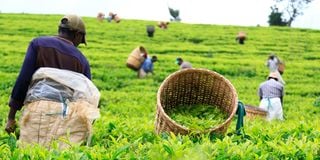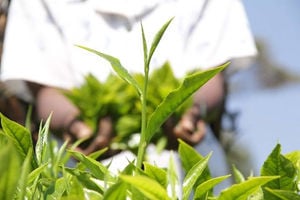
Workers pick tea leaves in a tea plantation.
In a bid to boost tea exports and increase farmers' incomes, the Tea Board of Kenya has embarked on campaigns to promote the plucking and processing of quality teas.
The board is targeting private factories that allegedly buy poor quality leaves from small tea growers for processing and sale in the local and export markets.
Poor quality has been cited as one of the main reasons for a glut at the Mombasa Tea Auction, with the government recently admitting that 100 million kilogrammes of manufactured tea, popularly known as black CTC (cut, tear and curl), had remained unsold for two years.
Principal Secretary for Agriculture Paul Ronoh and Tea Board of Kenya Chief Executive Officer (CEO) Willy Mutai said a review of the operations and licensing of private tea factories had begun in a bid to improve quality tea production in the country.
This comes as governors Hillary Barchok (Bomet) and Erick Mutai (Kericho), newly elected Kenya Tea Development Agency (KTDA) vice chairman Erick Chepkwony, KTDA directors from zones eight and nine, and county assembly members from tea growing zones held a consultative meeting in Bomet to chart the way forward in improving incomes for farmers in the sector.
“We are relooking at the licensing issues as part of the reforms in the tea sector to ensure that the standards that apply to KTDA factories on purchase of green leaves are equally applied by private factories in the country,” Dr Ronoh said.
“We should not compromise on tea production standards in the entire chain if we are to continue as the export market leaders in a sector that is a leading foreign exchange earner for the country,” Dr Ronoh said during a meeting with KTDA directors and farmers at Tirgaga tea factory in Bomet County.
Mr Mutai said inspectors from the Tea Board of Kenya were conducting campaigns in tea growing zones to educate farmers on the need to maintain high quality production while ensuring that private factories do not flout the rules.
He said it had come to the Board's attention that a number of traders were hawking tea, resulting in losses to farmers as they are underpaid and do not benefit from bonus payments.
“The Tea Board of Kenya, in conjunction with other government agencies, will crack the whip against factories and unscrupulous traders involved in the hawking of tea. It has led to the flouting of the set standards of plucking two leaves and a bud,” Mr Mutai said.
Mr Chepkwony said KTDA was working with the government and other stakeholders to address the governance and marketing issues raised by farmers and leaders as tea is a critical economic pillar for the country.
“KTDA is seeking to entrench high standards in production, expand the export markets for Kenyan-made tea to raise earnings by farmers in the sector. We should maintain our position as a leading foreign exchange earner for the country,” he added.
Prof Barchok and Dr Mutai said after the day-long consultative meeting at Famous Gates Hotel in Bomet town that governance issues at KTDA need to be addressed without politicising it to find a lasting solution that will benefit the country's 680,000 small tea growers.
The meeting also resolved that the Tea Act, 2020 should be repealed to allow factories to directly market their tea in the export market to address the glut at the auction and get higher prices.
“Some of the issues affecting the tea sector relating to governance, production, marketing and earnings, need to be addressed by the national and county governments, KTDA Holdings and farmers. It needs a multifaceted approach for lasting solutions to be found,” Professor Barchok said.
They called on the government to bail out KTDA factories from the huge loans they are burdened with, which have resulted in declining earnings by farmers in the 21 tea-growing counties.
“(The loans have) negatively affected interim and final (bonus) earnings by farmers. We should put more money in the pockets of the farmers,” Prof Barchok said.
Dr Mutai said, “In the history of this country, there is no government since independence that has bailed out the tea industry, while the sugar and coffee sectors have repeatedly enjoyed cushions from successive governments.”
“It is alarming that away from the commercial loans from financial institutions, there have been a lot of inter-factory loans, which speaks to the financial status of the individual factory units. There is a need for a bailout to enable the factories to normalise their operations.”
The reintroduction of direct sales of tea by factories and a review of the reserve prices that came into effect with the Tea Act, 2020, should be reconsidered, the leaders said.
“We need to give KTDA factories the latitude to sell their teas directly in the export market bypassing the Mombasa Tea Auction and remove the reserve price that instead of 2.9 of a dollar it has dropped to 1.7 of a dollar per kilogramme,” Dr Mutai said.
KTDA zonal directors – David Korir and Samson Menjoh – said factories should be allowed to sell their teas directly, bypassing the Mombasa Tea Auction, if they get attractive prices from customers abroad.
Mr Menjoh said there should be wide consultations and public participation before implementing reforms in the industry, while Philip Ngeno, a former KTDA director for Tegat-Chemaner zone, separately said the perception that tea from East of Rift is superior to that from West of Rift is misleading and should be addressed.
“There is no scientific backing for the claim on the categorisation that has been used for some time now in the market. It is a scheme meant to lock out produce from some regions from fetching high prices,” Mr Ngeno said.
Mr Ngeno, a large-scale tea grower, University of Kabianga lecturer and Corporate Governance expert, said the implementation of the Tea Act, 2020 was rushed, leading to the setting of reserve prices and requirement for all tea sales to go through the Mombasa Tea Auction.
“In effect, the factories could no longer service direct sales orders, even where they fetched premium prices. It is an issue that needs to be revisited by the government,” Mr Ngeno said.









